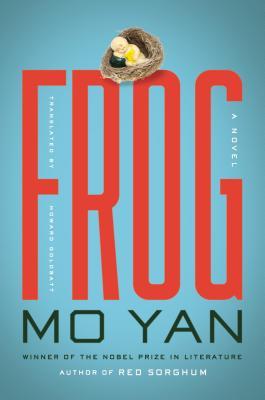 |
| Source: Goodreads |
Mo Yan
Translated by Howard Goldblatt (from Chinese)
2015, I read an advanced review copy
389 pages, historical fiction, psychological, epistolic
Thank you to the Goodreads Firstreads program, through which I had the opportunity to read a free advanced review copy of this book.
Tadpole, a Chinese playwright, is working on a play about the emotional fallout of the Cultural Revolution and the enforcement of the One-Child Policy. To organize his ideas, he writes a series of letters to his Japanese sensei describing his childhood memories and family stories. He focuses on the position of his aunt Gugu in their village community. A talented obstetrician, she was initially loved for her ability to save mothers' lives with new, modern medical techniques, but later she becomes the local face of the family planning commission. The novel, and Tadpole's play that is included at the end, explore the complexities of the political, moral, and medical situation created by the family planning policies of the Chinese state.
Mo Yan won the Nobel Prize in Literature in 2012.
Read a sample:
Buy from Amazon:
Frog: A Novel
Local implications of national policy
How does the beloved village obstetrician become the most hated woman in the area? By ruthlessly and tirelessly enforcing the government's family planning policy. Tadpole's narrative truthfully and somewhat dispassionately describes his aunt's actions - placement of IUDs without informing the patient, forced abortions and pursuit of women who try to avoid the restrictions, maternal deaths due to very late-stage abortions. The policy's horror, violence, and terror is explicitly described.
But there is a logic behind the policy. China's population must be controlled, or else there will not be enough resources to take care of everyone. Tadpole can see that side of the issue as well. Gugu bases her actions on it. At the same time, villagers have other concerns - the desire for a son, their need to assert their discontent with the state, their resistance to human rights abuses. All sides in the argument have truth to them. The brilliant part of this novel is how Mo Yan includes many perspectives and demonstrates their merits and their problems, without revealing a clear-cut opinion about what would be the right solution to China's population control problems.
Guilt and grief
Despite the state's support of her actions, Gugu is wracked by guilt for everything that she did, especially the thousands of abortions that she performed. She does not necessarily regret what she did, as she felt that it was necessary, but she does feel guilty for doing it. It is a complicated emotion, and one that fills out this complicated, strong female character.
The news media and other commentators often attempt to label such people as simply evil. Mo Yan demonstrates that people are not evil, even if their actions are, and they can repent and regret their actions even while performing them.
The Play
The main trope of this book is that it is a series of letters written to help Tadpole get his thoughts in order for a play that he is writing. Therefore, the last section is a draft of the resulting play.
While I thought it was very important to include the play at the end of the novel, I did not understand the play itself. The play is written in a post-modern, confused style which I did not know how to interpret. It is evident that it continues the emotional contours of the novel itself, but is it also an attempt to wrap up the story? Is it trying to comment on the rest of the text?
What meaning did you find in the play?
Want to see more reviews of world literature and film? Subscribe to The Globally Curious's email list, follow me on Twitter, or like my facebook page!
No comments:
Post a Comment